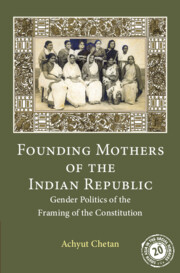Book contents
- Frontmatter
- Dedication
- Contents
- List of Images
- Preface
- Acknowledgements
- List of Abbreviations
- Introduction: Towards a Feminist Reading of the Making of the Constitution
- 1 In the Shadow of the Founding Fathers
- 2 In Search of the Missing Mothers
- 3 Women’s Moral Imaginary and Constitutional Politics: 1927–1946
- 4 Patterns of Participation: Women Members in the Constituent Assembly
- 5 Writing the Rights: Inscribing Constitutional Morality
- 6 Reformulating the ‘Woman Question’: Challenging Customs and Traditions
- 7 After the Framing
- Conclusion: Remembering the Founding Mothers
- Appendix: Texts and Contexts of the Framing – A Timeline
- Bibliography
- Index
Conclusion: Remembering the Founding Mothers
Published online by Cambridge University Press: 27 September 2022
- Frontmatter
- Dedication
- Contents
- List of Images
- Preface
- Acknowledgements
- List of Abbreviations
- Introduction: Towards a Feminist Reading of the Making of the Constitution
- 1 In the Shadow of the Founding Fathers
- 2 In Search of the Missing Mothers
- 3 Women’s Moral Imaginary and Constitutional Politics: 1927–1946
- 4 Patterns of Participation: Women Members in the Constituent Assembly
- 5 Writing the Rights: Inscribing Constitutional Morality
- 6 Reformulating the ‘Woman Question’: Challenging Customs and Traditions
- 7 After the Framing
- Conclusion: Remembering the Founding Mothers
- Appendix: Texts and Contexts of the Framing – A Timeline
- Bibliography
- Index
Summary
[In the estimation of the current generation] they were not radical, not revolutionary. They are defined sneeringly as reformists, that they only bothered about middle class problems, marriage laws, widows, inheritance.
—Kamaladevi Chattopadhyay, 1983In 1974, a report titled Towards Equality was published by the Government of India. This report acquired the status of a foundational text for feminist research and practice. It was widely considered to have heralded the Second Wave of the women's movement in India. Prepared by the Committee on the Status of Women in India (CSWI), comprising 10 women, the report unsettled confidence in the constitutional promises with its revealing findings about ‘the further lowering of the status of women’ and ‘the process of regression developed during the Freedom Movement’:
Towards Equality was a severe indictment of the first twenty-five years of independent India's achievements to ensure Indian women's rights to equality, justice, freedom and dignity as promised to them by the Constitution.
As evident from its title, at the core of the Committee's ethical and social concerns was the notion of equality, which it recognized as ‘an article of faith in our Constitution’. This equality, the Committee concluded, had not been achieved even after two decades of the promise made in the Preamble. What made this conclusion so extraordinarily impactful and convincing was the way it was arrived at:
In coming to this conclusion, the Committee depended on data, information and hard evidence to make its point rather than an impassioned rhetoric. Its dependence on facts, figures, testimonies, details and record rather than value making judgements, has made the report a multidimensional chronicle – a benchmark, an advocacy document, a reference book and an archive of the period.
Its detailed statistical account of women's status ‘in the total context of a society’, saw women in professional, legal, economic, cultural, and social positions. It identified ‘areas and problems that required careful, scientific, and expert investigations’ and ‘sought the assistance of scholars and experts in different fields’.
Three reasons are commonly cited for the foundational status of Towards Equality. It was the ‘first’ comprehensive and scientific study of women at all levels of national life, and initiated the genre of status reports of women that has become an ‘acknowledged strategy of learning, policy making, political signalling and advocacy on important issues’.
- Type
- Chapter
- Information
- Founding Mothers of the Indian RepublicGender Politics of the Framing of the Constitution, pp. 275 - 286Publisher: Cambridge University PressPrint publication year: 2023

